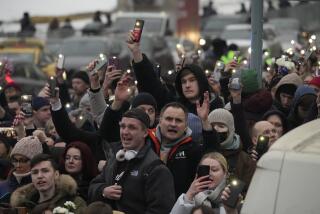Pravda Article Calls Yeltsin Power-Hungry, Unstable : Election: World chess champion Gary Kasparov urges a massive turnout for the presidential candidate Wednesday.
- Share via
MOSCOW — The Soviet Communist Party newspaper Pravda, fearing the victory of Boris N. Yeltsin in the Russian Federation presidential election this week and making a final effort to turn the radical populist into the campaign’s major issue, warned voters Monday that he is power-hungry and psychologically unstable.
“The main feature of Boris Nikolayevich’s personality is his excessive need for power,” three professors wrote in a savagely partisan “socio-psychological portrait” of Yeltsin two days before Russia’s election.
Throughout his career, Yeltsin has shown himself simplistic, disloyal and, above all, authoritarian, and his striving for power shows “an unconscious striving to compensate for feelings of inadequacy,” the professors said.
But Yeltsin’s popularity appeared undiminished by the professors’ attack as more than 20,000 people flocked to an afternoon rally in central Moscow, declaring their support for the political maverick and backing his campaign against the Communist Party’s continuing monopoly on political power.
“Boris Nikolayevich, Destiny Itself Sent You to Us,” read a banner at the rally in Manezh Square, just outside the Kremlin walls.
Gary Kasparov, the world chess champion, called for a massive turnout for Yeltsin on Wednesday to ensure that he wins overwhelmingly on the first ballot despite competition from five rivals.
“We must prove to the West that reform in the Soviet Union will be irreversible, and our only chance for this is to vote for Yeltsin,” Kasparov said. “It is not enough for Yeltsin to receive 51% of the vote--he must get two-thirds.”
Although virtually all opinion surveys show Yeltsin well ahead of his opponents, some Soviet political commentators have suggested that he could fail to win a clear majority in the first round and be forced into a runoff, perhaps against former Prime Minister Nikolai I. Ryzhkov or Vadim V. Bakatin, an adviser to President Mikhail S. Gorbachev.
“We are pushing for a sweep,” said Nikolai Travkin, the leader of the Russian Democratic Party and a Yeltsin backer, referring to the party’s drive to elect not only Yeltsin as president of the Russian Federation, the largest Soviet republic, but also Gavriil Popov as mayor of Moscow and Anatoly A. Sobchak as mayor of Leningrad.
“We want the people to take a stand that will be clear to all, that will constitute a mandate for Yeltsin and for reform,” Travkin said. “That there are six candidates does not mean there are six paths to change in Russia. There are only two doors--one back to the past, the other forward through radical reform.”
Pravda’s article was one of the strongest attacks yet on Yeltsin, although other Communist Party papers have suggested alliances with organized crime at home and the Mafia abroad, along with failings that range from serious alcoholism to plain foolishness.
“This socio-psychological portrait of Boris Nikolayevich . . . shows that his actions and decisions are predictable only in one thing--their unpredictability,” the professors wrote. “His ideas change so easily that one can scarcely identify any of his convictions.”
The article also suggested that Yeltsin is slow-witted, finding it difficult to answer “questions that are for him ‘complex.’ ” Although Yeltsin has proved to be one of the Soviet Union’s most effective campaigners, the professors said his speeches were “characterized by a very monotonous vocabulary, heavy expressions and even a certain sluggish way of articulation.”
As the brief, three-week campaign drew to an end, Yeltsin was indeed both the leading candidate and the hottest issue. During a 2 1/2-hour television debate Monday night, his opponents found themselves not propounding their own policies so much as differentiating them from Yeltsin’s and trying to assert their leadership as superior to his.
“He has not even graced us with his presence,” said Vladimir V. Zhironovsky, one candidate, “and yet we seem unable to find anything else to discuss than what we would do better or differently. . . . Is this election about Yeltsin or the presidency of Russia?”
Yeltsin, who was campaigning in Syktyvkar, the capital of the Russian Federation’s Komi region, had refused to participate in what would have been a six-way debate, saying that as chairman of Russia’s Parliament, he had prior commitments in Komi and in the Volga River town of Samara.
The reality, Soviet political journalists said, was that he saw no value in publicizing his competition. He was content, they said, to let the empty chair suggest to viewers his contempt for his opponents despite the risk of losing the votes of those who considered it cowardly for him to refuse to participate.
More to Read
Sign up for Essential California
The most important California stories and recommendations in your inbox every morning.
You may occasionally receive promotional content from the Los Angeles Times.













